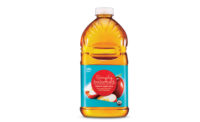Following years of growth, total consumption of private-label products has softened as of late, says Harry Balzer, chief industry analyst for The NPD Group, Port Washington, N.Y. “We saw a nice continuous run for a decade, and then in the last year or two, that started slowing down,” he says. “It’s reached a plateau — it’s not declining; it’s not [growing].”
From 2000 to 2010, the category grew by 10 percentage points because of consumers turning to private-label products to save money in the face of a difficult economy, Balzer says.
However, private label now has entered a phase of pockets of growth among categories and retailers, rather than a general expansion, wrote Daniel Grubbs, principal of Information Resources Inc. (IRI), Chicago, in its November 2012 report “Reversal of Fortune: National Brands Pick Up Gains on Private Label.” In fact, private label's unit share of consumer packaged goods (CPG) spending declined 17.1 percent in 2012, marking the second consecutive year of declines, and private label's penetration decreased in every measured channel except club stores between 2010 and 2012, he wrote. More specifically, total private-label craft beer case sales dropped 6.3 percent in the 52 weeks ending July 14 in supermarkets and drug stores compared with the prior-year period, reports Dan Wandel, principal for beverage alcohol client insights at IRI. Private-label beverage manufacturer Cott Corp., Tampa, Fla., also reported a 7 percent decrease in revenue in the third quarter of 2013 compared with the prior-year quarter. These share losses have been driven by the fact that national brands gained share in 40 of the 100 largest CPG categories in 2012, Grubbs added.
Private label’s main selling point is its price, which typically is lower than most national brands, The NPD Group’s Balzer says. In fact, 48 percent of all consumers report that they purchase private-label products to save money, according to Datamonitor, London. Retailers can use this positioning to their advantage by stocking a balance of national brands and private-label brands in order to highlight the value, IRI suggests.
To further help private-label products stand out on the shelf, brands also can introduce products with more unique flavors or functional ingredients, suggests Virginia Lee, U.S. analyst for Euromonitor International, Chicago. “If [private-label brands] are just going to be introducing products that are pretty much flavor-by-flavor very similar to the national brands but have a lower price, that kind of strategy can only get you so far,” she says.
Showcasing flavor differentiation, Minneapolis-based Target Brands Inc.’s Simply Balanced wellness grocery line offers Essence Water products in Blood Orange, Black Cherry, Coconut Pineapple, Peach Lemonade and Strawberry Watermelon varieties, Lee notes.
In general, bottled waters tend to be one of the top-selling categories for private-label beverages, Lee says. “For products like spring water and the gallon jugs, I think it’s fair to say that a lot of consumers consider those to be commodity-type products with very little difference between a [private-label] jug of water and a [branded jug of water],” she says. Both private-label spring and flavored waters offer higher margins for retailers, which in turn ensures better shelf placement, she adds. Private-label bottled water sales increased 13.5 percent to approximately $1.7 billion during the 52 weeks ending Oct. 6 in U.S. supermarkets, drug stores, mass market retailers, gas and convenience stores, military commissaries, and select club and dollar retail chains, IRI reports.
Target’s Simply Balanced line also brings a new level of private-label competition to its stores as an organic line, Lee notes. Approximately 40 percent of the 200 food and beverage products in the line are organic, and many of the items are made without GMOs. Target plans to eliminate all GMO ingredients from the line by 2014, the company says.
Private-label brands also are proving that they can keep up with innovations in the branded beverage marketplace. After Green Mountain Coffee Roasters’ (GMCR) patent on the K-Cup expired in September 2012, many private-label lines moved in with their own single-cup coffees, starting with the launch of Pleasanton, Calif.-based Safeway Inc.’s and Ottawa, Ill.-based Kroger’s products last September, Euromonitor’s Lee says.
This year, Whole Foods Market Inc., Austin, Texas, released private-label organic coffee pods for use with GMCR’s Keurig machines under its 365 Everyday Value line. Aldi US, Batavia, Ill., also released in October its exclusive line of Beaumont Coffee single-serve coffee cups, which retail for $5.79 for a 12-pack, compared with $16.49 for a 24-pack of GMCR K-Cups.
Packaged Facts estimates that private-label single-cup brew coffee could grow from $125 million in 2013 to $750 million in 2016, according to its July 2013 report “Single-Cup Brew Beverage Products in the U.S.: Coffee Pods and Beyond.” In the 52 weeks ending Oct. 6, private-label single-cup coffee sales jumped more than 1,990 percent to $140 million in measured channels, IRI reports.
Safeway also branched out from single-cup coffees into tea pods this fall with the launch of its Safeway Select Earl Grey, Jasmine Green Tea and Chai varieties, Euromonitor’s Lee adds.
Keeping up with other trendy products, Safeway also launched a private-label coconut water product this year, she notes. Despite the category’s popularity, coconut water has been an area that has not seen many private-label introductions, Lee says. Many retailers, including Target, Walmart and Jewel, also offer private-label liquid concentrates in line with the popularity of Northfield, Ill.-based Kraft Foods Group Inc.’s Mio liquid water enhancers, she adds.





